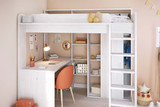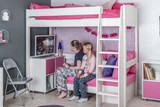Bedroom Digitisation: Should you Allow TV’s, Phones or Tablets in Your Child’s Bedroom?
Raising children in the digital age presents parents with a number of concerns and raises a lot of questions about what is best. There are debates that uncover the reasons why you should keep your child’s room free of digital items and studies which have shown that items such as TV’s, Phones and Tablets can have a negative impact on sleep. This is often put down to them serving as a distraction as well as due to the blue light they emit.
It isn’t all negative, but it is important to find the right balance for you and your family. With the school holidays underway, there is even more concern about the use of digital items as, after all, there is now more opportunity to use them. Once the kids break up from school it is all the more important to make sure they are occupied. Children get bored rather easily and once they go from being at school all day to being at home with less to do this can escalate. This can often lead to them spending more time in the digital sphere to kill time and stay busy. But, does this have a negative impact on their sleep? Are there better ways they could be spending their time? And is it a good idea to let them have the items in their bedroom?
Blue Light
You’ve probably heard about the concept of blue light before. It is the light emitted by digital devices such as phones, computers, tablets and TV’s and it has a direct impact on how the body prepares to go to sleep. When it starts to get dark at night, our bodies naturally begin to get ready for sleep; this is largely due to the sleep hormone, melatonin, being produced. As an artificial light source, blue light stops melatonin in its tracks and actually convinces the body it is daytime, which can have a direct negative impact on sleep. The National Sleep Foundation advises that no TV’s, Phones or Tablets should be used at least an hour before bed in order to avoid these negative effects of blue light. For children, it can be tempting for them to ignore this, but by keeping their room free of devices, it will encourage this healthy sleep habit.
Distraction
Not only does blue light negatively impact sleep duration, but just the distraction of having a device in the room can have a dramatic impact on sleep quality. When children know the device is in their room, they are more likely to be constantly thinking about it which can negatively impact their sleep. This can be especially true for teens who sleep with their phone next to their bed; it is more likely that they will wake up and check their phone for messages or check social media throughout the night.
Alternatives
It can be difficult to keep children occupied during the summer holidays and it could be tempting to give in to their wishes and let them have their devices in their room but it can have a negative impact on their quality of sleep which can affect them when they go back to school. Therefore, it could be a good idea to keep the devices downstairs or at least put a time limit on bedroom use; for example, phones can be used in the bedroom until 7 pm or similar. Rather than having a digital bedroom, why not make a haven for other activities? If your child is into arts and crafts you could introduce a crafts corner, or similarly, if they enjoy dress up; they could have a fancy-dress area.
Whilst there are a number of debates about the effects of the digital on children and the benefits of having a device-free bedroom, it is down to personal choice and compromise a lot of the time on what you think is best for your family.
Recent Posts
-
Unlocking the Potential of High Sleeper Beds for Teenagers
As teenagers go through all the ups and downs of being a teen, their likes and dislikes change a lot
-
Choosing Between a High Sleeper Bed vs. Mid Sleeper Bed
As your little one grows, so do their needs, and finding the perfect kids’ bed for them becomes








